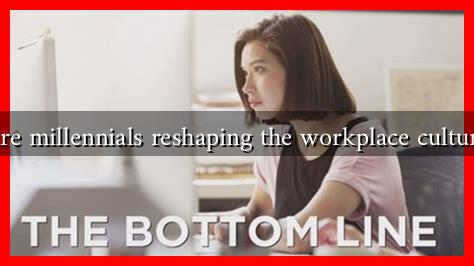-
Table of Contents
Are Millennials Reshaping the Workplace Culture?
As the largest generation in the workforce today, millennials—those born between 1981 and 1996—are significantly influencing workplace culture. Their values, preferences, and expectations are reshaping how organizations operate, leading to a more dynamic and inclusive work environment. This article explores the various ways millennials are transforming workplace culture, supported by relevant examples, statistics, and case studies.
The Rise of Remote Work
One of the most notable changes millennials have brought to the workplace is the acceptance and promotion of remote work. According to a report by FlexJobs, 80% of millennials prefer to work remotely at least part of the time. This shift has been accelerated by the COVID-19 pandemic, which forced many organizations to adapt to remote work models.
- Flexibility: Millennials value work-life balance and flexibility. Companies like Buffer and GitLab have adopted fully remote work policies, allowing employees to work from anywhere in the world.
- Productivity: Studies show that remote workers often report higher productivity levels. A survey by Airtasker found that remote employees work 1.4 more days per month than their in-office counterparts.
Emphasis on Diversity and Inclusion
Millennials are also driving a strong focus on diversity and inclusion in the workplace. They prioritize working for companies that reflect their values and are committed to social justice. According to a survey by Deloitte, 83% of millennials are actively engaged when they believe their company fosters an inclusive culture.
- Recruitment Practices: Companies are increasingly adopting diverse hiring practices. For instance, Unilever has implemented a blind recruitment process to eliminate bias and attract a more diverse talent pool.
- Employee Resource Groups: Organizations are establishing employee resource groups (ERGs) to support underrepresented employees. These groups foster community and provide a platform for employees to voice their concerns and suggestions.
Focus on Mental Health and Well-being
Millennials are more open about mental health issues than previous generations, advocating for a workplace culture that prioritizes well-being. A study by the American Psychological Association found that millennials are more likely to report stress and anxiety related to work, prompting companies to take action.
- Wellness Programs: Many organizations are implementing wellness programs that include mental health resources, such as counseling services and stress management workshops. For example, Google offers employees access to mental health professionals and wellness resources.
- Work Environment: Companies are redesigning workspaces to promote well-being. Open office layouts, relaxation areas, and access to natural light are becoming standard features in modern workplaces.
Technology Integration
Millennials are digital natives, and their comfort with technology is reshaping workplace operations. They expect seamless integration of technology in their work processes, which has led to the adoption of various digital tools and platforms.
- Collaboration Tools: Tools like Slack, Trello, and Zoom have become essential for communication and project management. These platforms facilitate collaboration, especially in remote work settings.
- Continuous Learning: Millennials value continuous learning and development. Companies are investing in online training platforms like Coursera and LinkedIn Learning to provide employees with opportunities for skill enhancement.
Conclusion
Millennials are undeniably reshaping workplace culture in profound ways. Their emphasis on flexibility, diversity, mental health, and technology integration is leading organizations to adapt and evolve. As companies recognize the importance of these values, they are not only attracting top talent but also fostering a more engaged and productive workforce. The future of work is being defined by the millennial generation, and their influence will continue to shape workplace culture for years to come.
For further insights on how millennials are changing the workplace, you can explore resources from Forbes.

